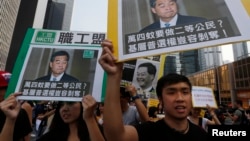The United Nations Human Rights Committee called on China on Thursday to ensure universal suffrage in Hong Kong, stressing that included the right to stand for election as well as the right to vote.
The panel of 18 independent experts, who monitor compliance with an international treaty on civil and political rights ratified by Hong Kong, agreed the move after voicing concern at Beijing's plan to vet candidates in the former British colony.
The committee agreed on “the need to ensure universal suffrage, which means both the right to be elected as well as the right to vote. The main concerns of Committee members were focused on the right to stand for elections without unreasonable restrictions,” Konstantine Vardzelashvili, who chaired the session, said at its conclusion.
Thousands have taken to the streets of Hong Kong in protest against central government plans to allow only Beijing loyalists to stand in 2017 elections in which Hong Kong people will vote for their own leader. Talks between student leaders and senior officials on Tuesday failed to break a deadlock.
Christine Chanet, a French judge and panel member, told Reuters “The committee doesn't want candidates filtered. The problem is that Beijing wants to vet candidates ... We have now put some pressure, but not too heavily, as we absolutely need China's cooperation.”
Emily Lau, a member of the Legislative Council of Hong Kong and chair of the Democratic Party of Hong Kong who attended the Geneva session, welcomed the U.N. watchdog's stance.
“One person, one vote, but the problem is the people who will stand is very limited. The committee was clear that what is proposed by China is not compliant with the Covenant, it is not universal suffrage,” Lau told Reuters.
The International Covenant on Civil and Political Rights, a landmark treaty adopted by the U.N. General Assembly in 1966, was signed by China in 1998 but never ratified. The pact guarantees fundamental freedoms including the right to self-determination and free and regular elections.
Law Yuk Kai, director of Hong Kong Human Rights Monitor, an activist group in Hong Kong, said “The committee rightly pointed to the right to stand and the problem of scrutiny by a vetting committee, which is not representative of the Hong Kong population.”





